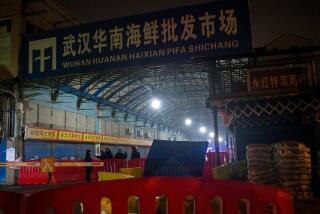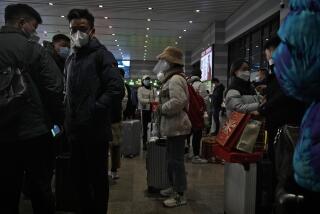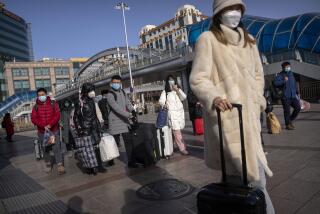China Revises Toll of Dead, Ill From Mystery Sickness
- Share via
BEIJING — China broke its silence Wednesday and said more people in the southern province of Guangdong had been struck by a mysterious respiratory illness than had been previously reported.
According to China, nearly 800 people have been infected and 34 people, including three in Beijing, have died. Until Wednesday, officials had insisted that only five people had died and about 300 were sickened from November to late February. It also claimed that the outbreak had not spread beyond Guangdong, where it originated.
An image-conscious China, worried about social instability and scaring away foreign investors, would prefer to keep quiet about the impact of illness, known as severe acute respiratory syndrome, or SARS. But the international community has been urging China to be more forthcoming in dealing with what has become a potential global health crisis.
The Chinese figures bring the global number of cases to 1,323 -- including 45 in the United States -- and 52 deaths, according to the World Health Organization.
The outbreak has prompted WHO to issue a global alert, its first in a decade. It also sent a team of experts to China to help investigate the cause.
So far, Beijing has not given investigators permission to go to Guangdong, asking them instead to work with government-supplied data. Nor have officials been willing to provide daily updates with province-by-province breakdowns of how the infection may be spreading.
Careful not to antagonize their hosts, WHO officials downplayed the significance of China’s newly released death toll, saying that the virus’ impact here had probably already passed its peak.
The new numbers “follow the epidemiological curve for that kind of outbreak,” said Chris Powell, a WHO spokesperson in Beijing. “The big part of the epidemic is over. [The numbers] won’t keep going up. It’s just a full reporting of what happened.”
That’s little comfort to nearby Asian cities still horrified by their own soaring infection rates, believed to be an extension of the outbreak in China. Singapore, which reported at least one dead Wednesday and about 74 infected, quarantined more than 800 people suspected of having SARS, slapping violators with fines of up to $10,000. The government also shut down its schools, telling half a million children to stay home.
But the worst hit place outside mainland China is probably Hong Kong, a former British colony that is now a special administrative region of Beijing. With its across-the-border proximity to Guangdong and its reputation as an international transportation hub, the island became the disease’s new launching pad.
SARS already has killed 11 people there and sickened about 300, including the government’s top medical official, who had visited the sick and coordinated the city’s response effort. William Ho’s hospitalization Sunday shattered public confidence as nervous residents hid behind surgical masks and hauled children from schools.
“It’s a city under siege. Everybody is scared because you don’t know where it’s coming from and where you will be hit,” said Wai-hong Yeung, publisher of Next Magazine in Hong Kong.
As the pattern of the outbreak unfolds, Hong Kong’s vulnerability to China’s health threats and its reluctance to share information have became painfully clear.
The source of the island’s outbreak has been traced to a Guangdong doctor who was sick when he checked into a Hong Kong hotel after China said the disease was under control. Seven people who stayed on the same floor have come down with SARS, including an American businessman who later died in a Hong Kong hospital where he infected scores of others. A Canadian tourist, also a guest in the hotel, apparently carried the disease home to her grown son before dying. Ontario has declared a provincial emergency because of the illness.
Early this week, more unnerving news came that nine Hong Kong tourists had fallen ill after sitting near a sick man on a flight to Beijing. The 73-year-old had been visiting his brother, who was a patient at one of the contaminated Hong Kong hospitals.
Until more is known about the exact transmission route of the virus, WHO has declined to issue any travel restrictions. Many countries have advised their citizens to avoid unnecessary travel to Asia, even though researchers say the disease is most likely spread through direct contact with large droplets of bodily fluid from the infected, such as those expelled by sneezing.
Tourism is a driving force in Hong Kong’s economy and the island has become increasingly dependent on thriving cross-border traffic from the mainland. The killer outbreak has sounded alarm bells both about this growing interdependence and the ability of the respective governments to manage a crisis.
“We are a world-class city and we are a neighbor to a third-world country with very different hygiene and health standards,” said Yeung, the publisher. “But the Hong Kong government is afraid to offend Guangdong, which kept saying things are under control. If people started taking precautions early, if the government had developed a scheme to isolate the suspected cases, the situation would be much better.”
More to Read
Sign up for Essential California
The most important California stories and recommendations in your inbox every morning.
You may occasionally receive promotional content from the Los Angeles Times.













